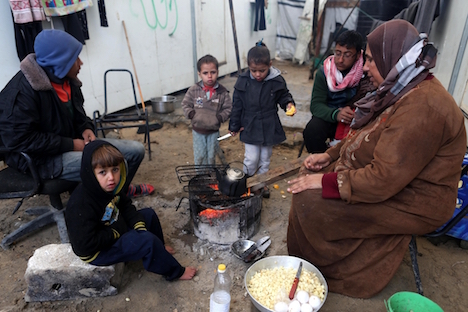There is no ‘post’ traumatic stress in Gaza because the trauma is continuous
 Print This Print This
By Dr John Soos, Mondoweiss
Mondoweiss
Wednesday, Feb 3, 2016
 |
| Members of a Palestinian family living in a container as a temporary replacement for their house that was destroyed by Israeli shelling during the 50 day war in 2014, warm themselves next to a fire during a rainy day in Beit Hanoun in the northern Gaza Strip, Jan. 24, 2016. (Photo: Mohammed Asad/ APA Images) |
The chokehold on Gaza moved into its tenth year in 2016. The suffering born of a decade of human rights violations, poverty and three full-scale military assaults creates a psychological toll on the population which is inestimable. Homelessness, multiple deaths within families, severe injuries, and the ever-present threat of renewed Israeli bombardment create a psychological climate of ongoing continuous, collective trauma.
Post traumatic stress disorder, as a clinical term, barely touches the enormity of the disabling psychological distress that permeates the reality of daily life here. There is nothing “post” about a continual, unrelenting, multifaceted catastrophe. There is also no “disorder” in the sense that there is an intrapsychic disease requiring individualized treatment. The abnormality is the unabated war crimes that inflict suffering on the imprisoned, helpless civilian population. The rest of the world, moreover is turning it’s back on this political violence and is thus enabling the trauma-inducing occupation and blockade to continue.
Mental health professionals in Gaza are strained beyond capacity. Of the nearly two million residents of the 360 km2 area Gaza Strip, there isn’t a single person here who has not experienced multiple traumas. Continuous grief, nightmares, disabling anxiety and hopelessness color everyone’s daily life. The therapists charged with healing these injuries are themselves victims of living in this traumatogenic environment. Their burden is thus two-fold: the trauma they share with their clients is compounded by repeat exposure to their clients’ own clinical material.
As a clinical psychologist from Vancouver, I joined the Washington Physicians for Social Responsibility delegation in Gaza to address the vicarious, secondary trauma that mental health professionals struggle with. In one workshop of ten therapists, four had their homes demolished and three spoke of having family members killed in last summer’s massacre. Overlay on top of this traumatic loss, the painful events their clients unfold all day, and the magnitude of the psychologists’ burden is clarified.
The aim of our training seminar was to introduce burnout prevention skills and the relevant literature on trauma and psychological resilience. Cognitive behavior therapy, behavioral self-care, self hypnosis, journal-writing and peer supervision for ongoing social support were among the therapeutic skills reviewed. In an attempt to keep the material culturally relevant and subjectively meaningful, a relaxation script was created in Arabic language for each participant using personally generated healing imagery. The visualization was then recorded by each therapist onto their mobile phones to be available as their tailor-made “portable” stress management strategy. Moreover, as the political and the clinical are interwoven, we expanded the idea of “to exist is to resist” to include “resistance is resilience”. Resisting oppression was conceptualized as adaptive coping in that it is a psychologically healthy way to counter hopelessness and promote resilience in face of adversity – both for the psychologist and for the client. The inverse is also true. Practicing self-care promotes resilience, which is an act of resistance. (“I will maintain my psychological health in spite your efforts to annihilate my self and culture”.)
It didn’t take long for a trusting environment to be established and for people to share details of their own experiences of trauma. We worked with this material as a way to model the therapeutic value of peer support, to learn new clinical skills, and to help cognitively integrate and in turn release some of the accumulated emotional pain that comes with living and working here. We plan to continue working together via Skype.
I learned much from my Palestinian mental health colleagues and am grateful for having met this extraordinary group. May the time come soon when the source of this trauma is ended and we can begin to truly speak of healing post traumatic injuries.
John Soos, PhD is a Vancouver-based Palestine solidarity activist and clinical & peace psychologist. With a longstanding interest in the psycho-spiritual benefits of pilgrimage, he initially travelled to the Holy Land - as many do - as a pilgrim.
Source URL
|
 Print This Print This

|

